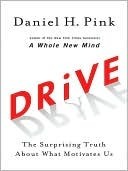More on this book
Community
Kindle Notes & Highlights
In 1960, MIT management professor Douglas McGregor imported some of Maslow’s ideas to the business world. McGregor challenged the presumption that humans are fundamentally inert—that
Frederick Herzberg, a psychologist-turned-management professor, proposed that two key factors determined how people fared on the job. The first were “hygiene” factors—extrinsic rewards such as pay, working conditions, and job security. Their absence created dissatisfaction, but their presence didn’t lead to job satisfaction. The second were “motivators”—things like enjoyment of the work itself, genuine achievement, and personal growth.
W. Edwards Deming, whose work was embraced in Japan with the same ferocity with which it was ignored in the U.S., argued that the route to quality and continual improvement was intrinsic motivation rather than extrinsic motivators like bonuses, incentive plans, and forced rankings.
an L3C “operate[s] like a for-profit business generating at least modest profits, but its primary aim [is] to offer significant social benefits.”
Economics, she explained, wasn’t the study of money. It was the study of behavior. In the course of a day, each of us was constantly figuring the cost and benefits of our actions and then deciding how to act.
Behavioral scientists often divide what we do on the job or learn in school into two categories: “algorithmic” and “heuristic.”
Researchers such as Harvard Business School’s Teresa Amabile have found that external rewards and punishments—both carrots and sticks—can work nicely for algorithmic tasks.
But they can be devastating for heuristic ones.
Those sorts of challenges—solving novel problems or creating ...
This highlight has been truncated due to consecutive passage length restrictions.
didn’t know it was missing—depend heavily on Harlow’s third drive. Amabile calls it the intrinsic motivation principle of creativity, which holds, in part: “Intrinsic motivation is conducive to creativity; contro...
This highlight has been truncated due to consecutive passage length restrictions.
work, which economists have always considered a “disutility” (something we’d avoid unless we received a payment in return), can often be a “utility” (something we’d pursue even in the absence of a tangible return).
Routine, not-so-interesting jobs require direction; nonroutine, more interesting work depends on self-direction.
Twain extracts a key motivational principle, namely “that Work consists of whatever a body is OBLIGED to do, and that Play consists of whatever a body is not obliged to do.”
There are wealthy gentlemen in England who drive four-horse passenger-coaches twenty or thirty miles on a daily line, in the summer, because the privilege costs them considerable money; but if they were offered wages for the service, that would turn it into work and then they would resign.1
“People use rewards expecting to gain the benefit of increasing another person’s motivation and behavior, but in so doing, they often incur the unintentional and hidden cost of undermining that person’s intrinsic motivation toward the activity.”4
Alfie Kohn, whose prescient 1993 book, Punished by Rewards,
“Rather than being offered as an ‘over-the-counter’ salve for boosting performance, goal setting should be prescribed selectively, presented with a warning label, and closely monitored,” they wrote.16 Goals that people set for themselves and that are devoted to attaining mastery are usually healthy. But goals imposed by others—sales targets, quarterly returns, standardized test scores, and so on—can sometimes have dangerous side effects.
The problem with making an extrinsic reward the only destination that matters is that some people will choose the quickest route there, even if it means taking the low road.
“Goals may cause systematic problems for organizations due to narrowed focus, unethical behavior, increased risk taking, decreased cooperation, and decreased intrinsic motivation. Use care when applying goals in your organization.” If


